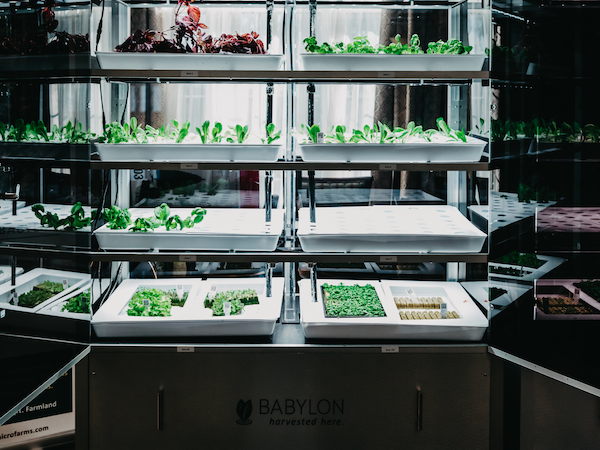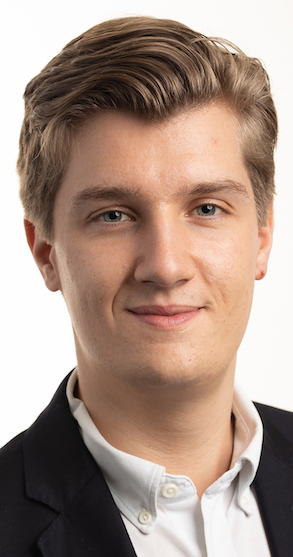
Babylon Micro-Farms develops remote-controlled, indoor farm systems that are used to grow vegetables, greens and herbs. (Photos courtesy of Babylon Micro-Farms)
A local tech startup is on the shortlist to win a nationwide prize for entrepreneurs making a difference in environmental technology.
Scott’s Addition-based Babylon Micro-Farms, which sells and leases modular vertical indoor micro-farms to businesses and individuals, is one of 10 finalists for the Verizon Climate Resiliency Prize, an award established last year to recognize new innovation that helps communities impacted by climate change.
Babylon CEO and co-founder Alexander Olesen said he was attracted to the contest’s goal of climate resiliency.
“When we live in an age where smoke fills the skies, and fire and drought and flooding are affecting different corners of the world on a constant basis … there is a whole industry marching toward net zero [carbon emissions],” Olesen said. “I desperately want that to succeed, but there is also an emerging trend here about resilience and adaptation, right? How do we make the basics, protect ourselves, protect the environment?”
Judges evaluate contestants on whether their products and services are ready to scale, focus on vulnerable populations and leverage 5G broadband technology.
The prize includes $500,000, split evenly among four winners, and consulting support from Verizon to help scale the businesses.
Founded in Charlottesville in 2017 by Olesen and Graham Smith, Babylon moved its headquarters to Richmond in 2021, motivated by a need for more space and a desire to expand its workforce.
Babylon’s office is at 3409 Carlton St. in Scott’s Addition. The company currently employs about 50 people, Olesen said.
In addition to its micro-farms, the company also monitors the farms remotely for clients using its in-house software. The farms can be grown indoors and use a hydroponic system.
Olesen said that in scaling the product with the prize money, Babylon hopes to make its micro-farms as accessible as possible.
“That is both making the user experience very easy so that anyone can do it and then also driving the cost down so that it’s more accessible from a price point of view,” Olesen said. “[The contest] helps us demonstrate how these micro-farms can help marginalized communities.”
Babylon currently serves clients in four countries and broadly across North America. It works with food services giant Aramark and has about 50 micro-farms placed in university campuses where Aramark has a presence. Babylon also has local relationships with Rise Richmond, formerly known as Church Hill Activities and Tutoring (CHAT), and Henrico County schools. Many of its clients are schools, hospitals and senior living facilities, according to its website.
Other finalists in the Verizon contest include Perimeter, an emergency communications platform; Electric Fish, which makes chargers for electric vehicles; and Raincoat, an insurance startup that makes payments immediately after climate disasters to bolster financial recovery, alongside other entrepreneurs.
Winners are to be publicly announced at the end of October at the VERGE 23 climate tech conference in San Jose, California.
Babylon wrapped an $8 million capital raise earlier this year, which Olesen told BizSense in April would expand its client partnerships and fund marketing initiatives and software updates for the company’s app used by customers.

Babylon Micro-Farms develops remote-controlled, indoor farm systems that are used to grow vegetables, greens and herbs. (Photos courtesy of Babylon Micro-Farms)
A local tech startup is on the shortlist to win a nationwide prize for entrepreneurs making a difference in environmental technology.
Scott’s Addition-based Babylon Micro-Farms, which sells and leases modular vertical indoor micro-farms to businesses and individuals, is one of 10 finalists for the Verizon Climate Resiliency Prize, an award established last year to recognize new innovation that helps communities impacted by climate change.
Babylon CEO and co-founder Alexander Olesen said he was attracted to the contest’s goal of climate resiliency.
“When we live in an age where smoke fills the skies, and fire and drought and flooding are affecting different corners of the world on a constant basis … there is a whole industry marching toward net zero [carbon emissions],” Olesen said. “I desperately want that to succeed, but there is also an emerging trend here about resilience and adaptation, right? How do we make the basics, protect ourselves, protect the environment?”
Judges evaluate contestants on whether their products and services are ready to scale, focus on vulnerable populations and leverage 5G broadband technology.
The prize includes $500,000, split evenly among four winners, and consulting support from Verizon to help scale the businesses.
Founded in Charlottesville in 2017 by Olesen and Graham Smith, Babylon moved its headquarters to Richmond in 2021, motivated by a need for more space and a desire to expand its workforce.
Babylon’s office is at 3409 Carlton St. in Scott’s Addition. The company currently employs about 50 people, Olesen said.
In addition to its micro-farms, the company also monitors the farms remotely for clients using its in-house software. The farms can be grown indoors and use a hydroponic system.
Olesen said that in scaling the product with the prize money, Babylon hopes to make its micro-farms as accessible as possible.
“That is both making the user experience very easy so that anyone can do it and then also driving the cost down so that it’s more accessible from a price point of view,” Olesen said. “[The contest] helps us demonstrate how these micro-farms can help marginalized communities.”
Babylon currently serves clients in four countries and broadly across North America. It works with food services giant Aramark and has about 50 micro-farms placed in university campuses where Aramark has a presence. Babylon also has local relationships with Rise Richmond, formerly known as Church Hill Activities and Tutoring (CHAT), and Henrico County schools. Many of its clients are schools, hospitals and senior living facilities, according to its website.
Other finalists in the Verizon contest include Perimeter, an emergency communications platform; Electric Fish, which makes chargers for electric vehicles; and Raincoat, an insurance startup that makes payments immediately after climate disasters to bolster financial recovery, alongside other entrepreneurs.
Winners are to be publicly announced at the end of October at the VERGE 23 climate tech conference in San Jose, California.
Babylon wrapped an $8 million capital raise earlier this year, which Olesen told BizSense in April would expand its client partnerships and fund marketing initiatives and software updates for the company’s app used by customers.

When we live in an age where arsonists ignite fires, downed power lines burn down resort towns, and once-a-century storms hit the desert west I’m going to grow enough leafy greens to maybe make a small salad. The “flat-climate”* talking points all covered. *The earth’s climate never changes and can’t change. There is not enough carbon neutral electricity to feed “vulnerable” populations.
But the GMO’s will allow you to get TWO salads….